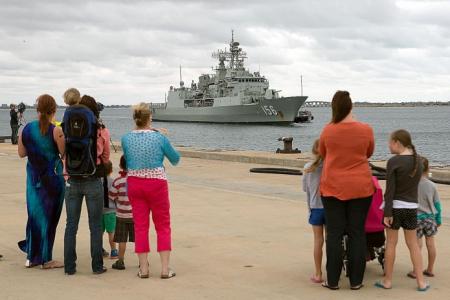Search for missing plane becomes a spying game
Military technology might hold key to locating flight MH370
The search for flight MH370 has involved more than two dozen countries and 60 aircraft and ships, but has been bedevilled by regional rivalries.
While Malaysia has been accused of a muddled response and poor communications, China has displayed its growing military clout and reach. At the same time, some countries accuse others of dragging their feet on disclosing details that might give away sensitive defence data.
The finger-pointing highlights growing tensions in a region where the rise of China is fuelling an arms race. Several countries, including China, Malaysia, Indonesia and the Philippines, are engaged in territorial disputes, with the control of shipping lanes, fishing and potential hydrocarbon reserves at stake.
As the mystery over the fate of the Boeing 777 and its 239 passengers and crew deepened, it became clear that highly classified military technology might hold the key, Reuters reported. A reluctance to share sensitive data appeared to harden as the search area widened.
"This is turning into a spy novel," said a South-east Asian envoy, noting it was turning attention to areas and techniques few countries liked to publicly discuss.
With the US playing a relatively muted role in the sort of exercise that it would have dominated until recently, experts and officials say there was no real central coordination until the search for the plane was confined to the southern Indian Ocean, when Australia took charge.
Part of the problem is that Asia has no Nato-style regional defence structure, though several countries have formal alliances with the US.
"There is a pressing need for regional security structures to take a few leaps forward," said air vice-marshal Michael Harwood, a retired Royal Air Force pilot and former British defence attache in Washington.
The risk, he said, was that the search would be seen as a national "test of manhood" and driver of rivalry.
Already, several governments have been openly competing in announcing findings and satellite images.
Malaysia's acting transport minister Hishammuddin Hussein, who is also the country's defence minister, has defended the international effort to find the jet.
He said: "All countries involved are displaying unprecedented levels of cooperation, and that has not changed."
But while Kuala Lumpur has been forced to reveal some of the limits and ranges of its air defences, the reluctance of Malaysia's neighbours to release sensitive radar data may have obstructed the investigation for days.
At an ambassadorial meeting on March 16, Malaysia formally appealed to countries on the jet's possible path for help. It was met in part with polite stonewalling, two people close to the talks said.
Some countries asked Malaysia to put its request in writing, triggering a flurry of diplomatic notes and high-level contacts.
"It became a game of poker in which Malaysia handed out the cards at the table, but couldn't force others to show their hand," a person involved in the talks said.
It was not until a week later that Malaysia announced a list of nations that had checked their archives.
Beijing, meanwhile, was dramatically upping its game.
Its ability to deploy forces deep into the southern hemisphere is particularly striking.
"China is deploying because that's what great powers do, and there must be a political expectation for it to (do so)," said one former Western military officer. "How well they do it, only the US will know (through surveillance and signals intelligence), and time will tell."
Ultimately, the only country with the technical resources to recover the plane may be the US. Its deep-sea vehicles hauled up the wreckage of Air France 447 after its crash in the South Atlantic in 2009.
So far, Washington has sent two Poseidon maritime reconnaissance aircraft to the southern Indian Ocean search. It has also sent an underwater drone and its Towed Pinger Locator, specifically designed to detect the signals from black boxes.
As in the northern Indian Ocean, where Chinese forces operate alongside other nations to combat Somali piracy, current and former officials say all sides are almost certainly quietly spying on and monitoring each other at the same time.
Get The New Paper on your phone with the free TNP app. Download from the Apple App Store or Google Play Store now

